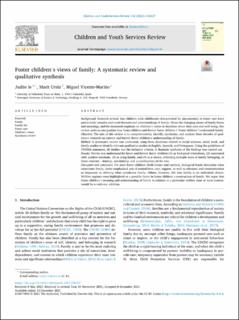| dc.description.abstract | Background
Research reveals that children with childhoods characterised by placement(s) in foster care have particularly complex and multi-dimensional understandings of family. Given the changing nature of family forms and meanings, and the increased emphasis on children’s voices in decisions about their care and well-being, this review seeks to encapsulate how foster children and former foster children (“foster children”) understand family.
Objective
The aim of this review is to comprehensively identify, synthesise, and analyse three decades of qualitative research on current and former foster children’s understanding of family.
Method
A systematic review was conducted, using three databases related to social sciences, social work, and family studies to identify relevant qualitative studies in English, Spanish, and Portuguese. Using the guidelines of PRISMA statement, 20 studies met the inclusion criteria. A thematic synthesis of the findings was carried out.
Results
Family was understood by foster and former foster children (1) as biological relatedness, (2) associated with positive emotions, (3) as doing family, and (4) as a choice, reflecting multiple ways of family belonging, in three contexts – kinship, non-kinship, and a combination of the two.
Discussion and conclusion
For most foster children (both former and current), biological bonds determine what constitutes family. Some emphasised acts of mutual love, care, support, as well as tolerance and communication as important in defining what constitutes family. Others, however, felt that family is an individual choice. Welfare regimes were highlighted as a possible factor in foster children’s construction of family. We argue that foster children’s meaning and understanding of family in relation to a particular welfare state or local context, would be a welcome addition. | en_US |

